According to Statista, there are 23.4 million developers in the world and this number is constantly growing. But are all of them equally well-skilled and can be hired for any programming job?
Toptal, a recruitment agency that interviews and filters out the best software developers internationally, states that only 3% of their candidates pass all five of their recruitment stages.
Of course, 3% is not enough to cover the needs of all projects in the world. But it does not mean that only ‘elite’ coders are privileged to be hired. Projects differ by complexity level, budget, and needs. As a business owner or a startupper, you’re facing a big challenge of identifying the best candidates exactly for your project.
So if you want to know how to hire a web developer, you are in the right place, we will answer this and many other most important questions that worry startuppers and business owners looking for skilled developers. Read on under the cut.
Question 1: When Should I Start Looking for a Web Developer?

Unless you have a clear idea of what you are looking for, you are not going to find anything. So, before starting any search, take time for the following preparation steps.
1. Understand Your Business Needs
Before asking how to hire a web developer, you should understand your needs.
- If you are a startup...
Conduct market research to know your competitors and their strong and weak points. You can try to validate your idea without coding. Use the techniques that imitate a ready online product while executing all services manually until you collect a client base. This will help you define the scope of necessary features and prove it is worth investing in software creation. At the stage of idea validation, you can also find a technical partner, investors, and attract your first users.
- If you have an existing business...
You may have different goals...
Perhaps, you’d like to improve the efficiency of your business processes with custom software, or you may have some legacy software that needs remodeling. Either way, you need to be clear about what business goals you are pursuing and how exactly the new software will help, and only after that start looking for a software developer.
For both, a startup and a company, this preliminary stage should be thoroughly done to escape costly changes in the future. On the pre-development step, you need to:
- Formulate the aims
- Describe a target audience
- Study the main competitors
- Detect the gaps in the services or processes
- Predict the risks
- Plan your budget
- Create a high-level description of the product.
2. Create Project Specifications
Once you are clear about the business goals and objectives of your project you need to translate them into project requirements or project specifications. This is how developers will understand what your project is about and will be able to give you estimates.
This document describes the project aims, types of users, all features, performance, and security requirements, which may contain mockups and guidelines for the user interface.
If you have very little experience with software development projects, you may find it difficult to prepare project specifications by yourself. In this case, you can ask someone knowledgeable to help or hire a Business Analyst.
Moreover, many agencies start working with a ‘discovery phase’ to help a client to formulate the needs and a result of this work will be project specifications.
Well-formulated project specifications give you lots of advantages:
- Time-saving — letting everyone read the single description instead of explaining the project to each new team member.
- Easier prioritization — having all features described in one place you can define the core and nice-to-have functionality, break tasks into milestones, and estimate the time and budget.
- Keeping it all written — will help you to avoid a lot of confusion and arguments with teammates.
- Tracking the changes — keeping the document versions allows the team to quickly roll back in case the new updates turn less usable than the previous ones.
- Getting the fullest overview of the solution — structuring the requirements allows you and your team to see the missing areas and new opportunities.
Do you need help with project specifications?
Contact UsQuestion 2: Who Do I Need to Hire for My Project?
If you start searching for a web developer for the first time, you may be astonished by how many different types of web developers there are. IT specializations have become highly segmented during the last decade. And if at the beginning of the 2000s, all developers were called just ‘programmers’, now, when new technologies emerge and evolve rapidly, each specialist tries to be the best in a narrow sphere.
So, before asking how to hire a developer, you need to decide whom exactly you need:
- A web developer or web designer — are they the same?
- Front-end, back-end developers — do I need both?
- Is it better to hire a full-stack developer?
- If an agency provides QA and Project manager — is it beneficial for me or do they try to shake me down?
- Do web app and mobile app developers differ?
These and many other questions are spinning around your head right now, don’t they?
To make the order out of the mess, let’s pull on that thread and talk about the main types of developers that you may need.
1. Web Designer vs Web Developer

Web designers and web developers are not synonyms, these are two completely different professionals! So let’s make it clear ‘who is who’.
Web designers are responsible for the visual part of your website, i.e. placing beautifully, clearly and harmoniously all the necessary elements of the website pages (icons, buttons, fields), picking the color scheme, images, and text fonts. However, these all are just static images that cannot function until a web developer makes them alive with the code.
A web developer, on the contrary, is a person who writes the code for the ready design created by a web designer.
Keep in mind that web design always goes before the programming as web developers need to link the graphic elements of design with the inner system.
Often, besides web designers, companies hire a UX designer who researches user experience, business, marketing, technologies, customer psychology, and trends to create a usable, accessible, and clear interface that will accentuate the user's attention on the most meaningful website elements. Some web designers can also be UX specialists.
2. Front-end vs Back-end Developer vs Full-stack Developer 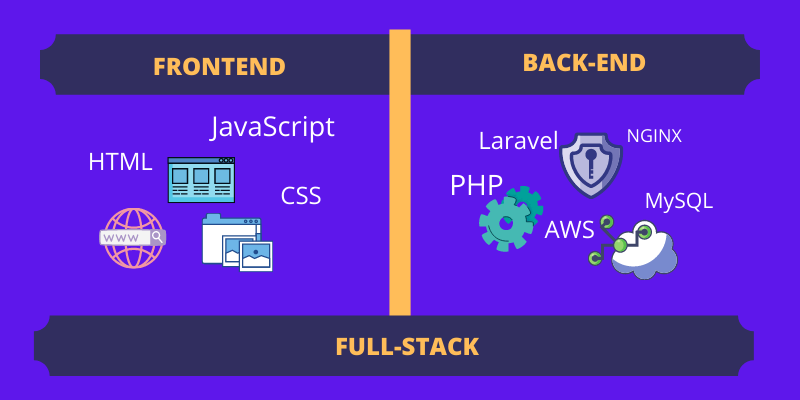
When you start looking for a web developer you may find out that there is a division of front- and back-end specialists. What does it mean?
A front-end developer (a client-side developer) specializes in the part of the website that is visible to the users in their browsers. The main technologies of a front-end developer are HTML, CSS, JavaScript, and different frameworks and libraries for the JS (e.g. React, Vue, Angular). With the help of these technologies, the developer interprets all the images created by the web designer into functional elements. Buttons now can be clicked and lead the user to the next steps of their ‘journey.’ From the front-end, the data is transferred to the back-end, the server part.
There are also narrowly specialized front-end programmers — HTML-developers who work only with HTML+CSS and cross-browser compatibility. In this case, the rest of the work is done by the full-stack developer or a team of front-end and back-end developers.
A back-end developer (a server-side developer) creates the architecture of the software and makes all the interactions between the features work as required. Without the back-end, the UI part would be only a set of clickable images leading nowhere. The skills of back-end developers usually include knowing at least one of the programming languages (PHP, Java, Ruby on Rails, Python, etc.) and their frameworks (for example, Laravel for PHP), various database management technologies (MySQL, MongoDB, Redis), web server technologies (Apache, Nginx), API development, data protection, cloud web serves (AWS, Azure), and to some extent front-end technologies.
A full-stack developer is a hybrid of both front-end and back-end developers. Also, they may fulfill the functions of a project manager and web designer.
Any full-stack developer should be able to implement a project from zero to launch — but it isn’t always the best way to go.
Though you may be attracted to the idea of hiring just one specialist for all tasks, you should understand that such an approach has some disadvantages:
- More time for finding a good specialist. These should be highly experienced people (at least 3-5 years of work as full-stack web developers).
- More risks to hiring a dilettante. It is just very hard to be equally great in so many technologies for one person. At best this person may be good at some part of tasks, which can be acceptable for a small simple project, but a nightmare for a larger complex one.
- Longer development. All the load will be on one person while in the case with separate front- and back-end developers they would complete the tasks in parallel, cutting the time of development. This is another reason why hiring a full-stack developer is best for small projects.
3. QA Engineer, Project Managers, and Other Specialists
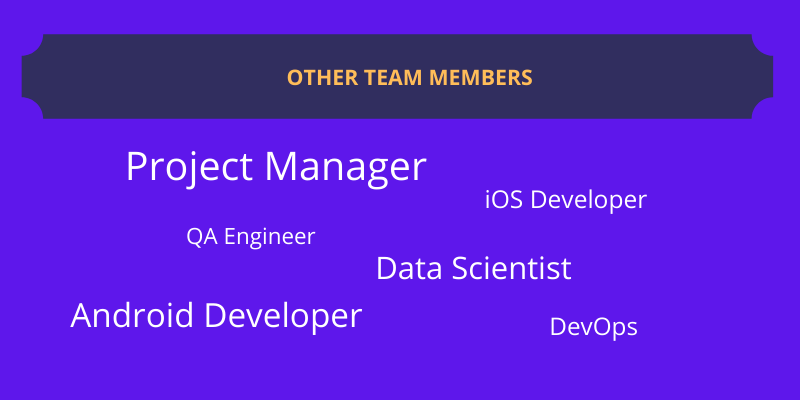
Apart from the developers and designers, usually, a project also needs QA engineers (or testers) who test the product and a project manager for administering the tasks, communicating with the client, and distributing the load among the team members.
If you hire freelance developers, you can play the role of a project manager, but when you outsource development to an agency, they usually provide their project manager for each project. This person arranges a smooth communication process between the web dev team and a client, manages the requirements, and makes sure the deadlines are met.
QA engineers are also usually part of the team to make sure the product is 100% ready for launch. Of course, developers can test the product by themselves, but QA specialists usually have a better user perspective, can generate more scenarios of user behavior to find all possible bugs, and have a big arsenal of tools to do it.
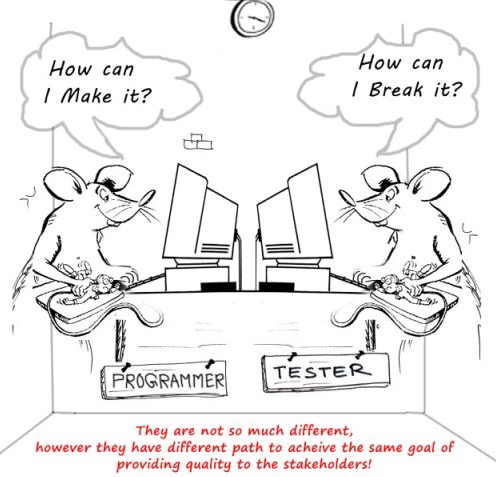
Projects may also require more specific developers, who stick to an exact technology or type of task. These can be specialists like a Data Scientist (who analyzes data to use it in Machine Learning, data visualization, and predictive modeling), a DevOps developer (who deploys and administrates back-end infrastructure), a WordPress developer (who specializes in configuring WordPress websites), and more specific types.
And what is also important is how to hire an app developer? If you want to hire a mobile app developer, you should know that, as a rule, they specialize in particular platforms (either iOS or Android). Most of the time, iOS and Android developers are two different developers and if you need an app for both platforms, you will have to hire both specialists.
So, the type of specialists needed depends on the task at hand.
Whether you are building a website or web application, you may need to find separately a web designer, front-end developer, and back-end developer, or a full-stack developer (to do everything). Another option is to hire a web development agency that will assign the whole team to you.
At Greenice, for our clients, we usually provide a team that consists of an HTML-developer, front-end and back-end developers, a QA Engineer, and a Project Manager.
Question 3: Is It Better to Work with an Agency or a Freelancer?
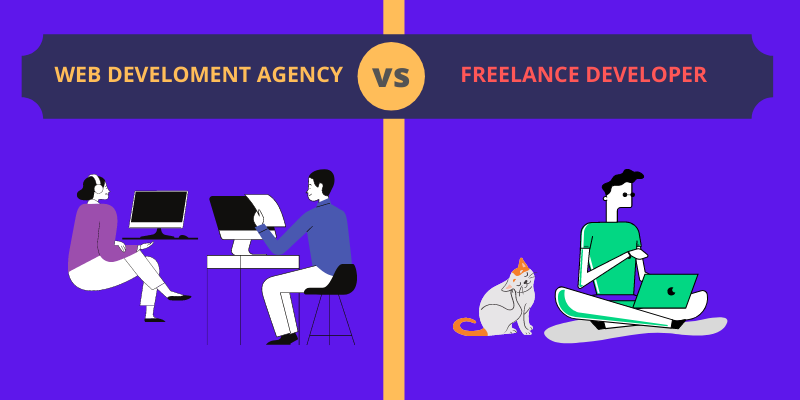
Companies that build their business solely around their IT product (like SaaS) usually create a team of developers in-house or remote specialists that work full-time from home. The owners of such businesses usually have a technical background and can do part of the technical jobs by themselves. Having an on-shore office of IT guys is an expensive way as you need to hire, onboard, and take care of your employees by yourself.
To cut costs, many companies prefer to search for offshore employees, choosing either independent freelancers or web development agencies.
The advantages of such an approach are:
- Cheaper development (offshore specialists work at lower rates)
- A larger pool of specialists, including rare ones
- No headache with office rental and employee management
- Possibility to hire for a short-time period without commitment to hiring full-time employees
- Within the realia of social distance because of COVID-19, remote work style is more preferable
Let’s review the pros and cons of hiring a web development agency vs a freelancer:
|
Web development agency |
Freelance developer |
|
|
Pros |
|
|
|
Cons |
|
|
|
Suitable for |
|
|
Question 4: How Should I Pay?
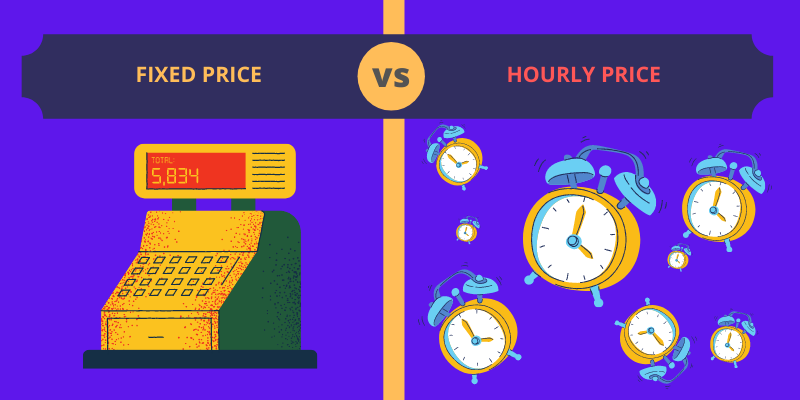
The question ‘How much does it cost to hire an app developer?’ is not limited to the number but also the way of payment. You can pay your web developer on an hourly basis or have a fixed price for the entire project. What payment type suits you best depends on the project.
A fixed price
Although it may seem convenient to have a final cost of the entire project, it doesn’t happen very often. To achieve this magical number you need to:
- think through every little detail of your requirements upfront
- be sure that there will be no changes.
As you can imagine, it is hard to meet these two conditions in projects with any degree of length and complexity. For medium and large projects, you’d need to spend months preparing such detailed specifications and there will still be no guarantee that nothing will change. Some developers and teams may agree to a fixed price, but they will put a substantial percentage as ‘insurance’ for the changes that may still occur.
But the fixed price can work for small projects, prototypes, and some parts of the job that are pretty straightforward.
An hourly price
With custom projects and an agile approach, the requirements can change frequently. The work is delivered in iterations of product versions that can be already tested in the wild. In this case, the hourly method is more preferable as it is the most flexible and lets you control the expenditures.
Since you are paying your developer by the hour, you may feel worried about how the time is calculated and whether he/she has really been working those billed hours. For your peace of mind, developers can use screen recording and time tracking software (at Greenice, we use Clocodo and Upwork tracker) to make the process transparent.
If you hire a freelance developer, it is better to pay through the platform that will play the role of a third-party to keep your money until the job is done. This provides security both for you (you’ll know that the developer won’t run away with your money) and the developer (who will know that he’ll be paid for sure). Working with an agency, you will have a contract that will serve as a guarantee of credibility.
Question 5: Where Can I Hire a Programmer?

Where to find a web developer? Besides the most evident ways like googling, publishing a job post on social media, and or asking friends, there are more specific places. Here they are:
1. Freelancers Platforms
Probably, everyone visited a freelance marketplace to search for a specialist at least once. Platforms like Upwork, Fiverr, Freelancer offer a great pool of specialists from all over the world. Here you can find not only a freelance programmer for an app but also a web development agency. If you are looking for a web designer or UX expert, then, visit 99designs, Dribbble, Behance.
The advantages of platforms for freelancers include:
- They are best for short-term projects or small tasks.
- Most of the platforms support the escrow payment method for secure deals between a client and a freelancer.
- You can see the rating and review for each candidate at once.
Disadvantages of the freelance platforms:
- There is no skills testing and background verification so everyone can apply for a job and you should be ready to screen candidates by yourself.
2. Recruitment Agencies and Job Boards
If you need a more reliable source of skilled developers to hire for the long-term, you may regard such websites as Toptal, Outsourcely, Remote OK, We Work Remotely, Hired, Lemon. These platforms thoroughly vet candidates before matching them to clients.
The distinctions:
- Focus on tech job positions
- Attract candidates that search for stable long-term remote work
- Perform skills testing and background verification
- The pool of specialists includes people from all around the globe
- Even rare specialists can be found.
However, using services of such platforms may have certain ‘minuses’ like:
- Toptal and alike recruiting firms include their markup into the developers’ rate. You can also be charged for successful hires, job posting, or subscription plan.
- Such platforms specialize mostly in outstaffing (team augmentation with a dedicated developer), not a complete team. So this variant will fit only the companies that already have a development team and need additional staff.
3. Business Reviews Platforms
If you don't have your team and want to find a web development agency, use rating, and review websites. The most renowned are GoodFirms and Clutch where you can:
- View the company’s profile and portfolio.
- Read the client’s reviews. They are either verified or collected by the platform manager (in the case of Clutch).
- Search companies by a multitude of filters like region, rates, services, etc.
- Contact the company through the special form.
The disadvantage is that unlike Upwork and similar platforms, Clutch and GoodFirms usually collect positive client feedback as the agencies only ask their loyal clients for ratings and reviews.
Are you looking for a web development agency to implement your project?
Contact UsQuestion 6: How Do You Know If It Is a Good Computer Programmer?
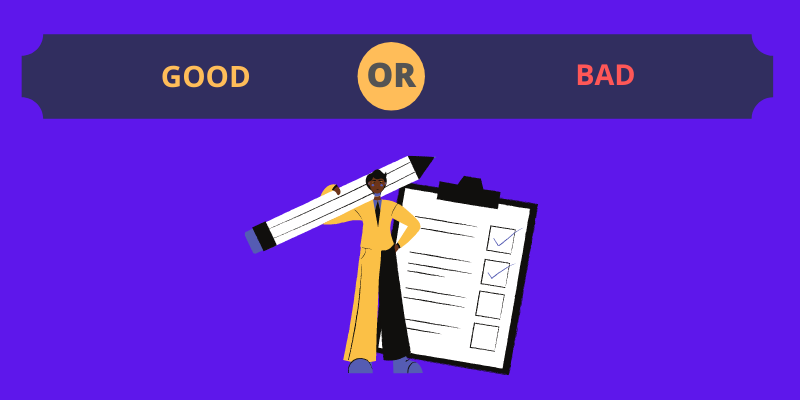
How to hire a web designer or developer with relevant skills and experience? What should you pay attention to? Here is a shortlist you can use for assessment:
- Read through the resume. This is the first step in the long chain of the hiring process. This can be a profile on the job board or an agency ‘About’ page on their website, but it will give you some impression of the people you are going to deal with.
- Review a portfolio. All experienced developers and agencies should have a portfolio (with links) of their projects. So you can ask for a portfolio to make sure that your candidate has already done some similar tasks or has competence for work on your project.
- Ask for clients’ reviews and references. Check out the ratings and reviews. For an agency, use Clutch and GoodFirms, for freelancers — Upwork or another platform where she is registered. These platforms allow only verified clients to leave reviews. You can also ask for direct references and get in contact with them personally.
- Schedule a video call. You can use Skype, Zoom or Google Meets to discuss your project and learn more about the candidates. During the call note if they are genuinely trying to understand your project and needs, if they are asking meaningful questions, and making useful suggestions. Even before and after the interview, you can notice how the candidates behave. Do they respond quickly? Do they provide everything they’ve promised during the call? Are they punctual?
- Conduct the tests. To test the technical skills of a website creator, you need to have the technical background yourself. If you have no such competence, the best way is to hire through platforms like Toptal and Lemon that screen candidates or work with a trusted agency. In case you are somewhat technical, you can use sites like Codility or Devskiller to screen freelance candidates for coding skills. Of course, they cannot give you a 100% guarantee of competence, but they can help to weed through and shortlist candidates.
- Order a pilot project. Before committing to a long-term relationship, you may start with a small task or a set of tasks to check the capabilities and reliability of the candidates. This can be a small part of your project, the implementation of which you will pay for anyway. This step can demonstrate to you better than any other tests and skills verifications how the chosen developers work in real conditions.
- Listen to your gut feeling. Intuition is a powerful tool that may help you to make the final decision. You will probably feel worried if you hire a person that you do not trust or just feel uncomfortable talking to or even stay in one room. So pay attention to what your 6th sense tells you.
Question 7: Is It the Fair Price and Where Does the Difference in Pricing Come from?

‘How much does it cost to hire a web designer or web developer?’
'Companies seeking to cut rates need to ask themselves what they are willing to give up in return, says Accelerance CEO Andy Hilliard. “Less English competency? Less expertise? Less seniority in development? Less QA? No one ever gets something without giving in return. If the primary goal of your offshore strategy is either cash conservation or price reduction, go for that model, but within that subcontinuum pay the absolute most you can.'
When you choose among the offers from developers and agencies, you may notice how different the rates are. Why is it so? Let’s list what else may influence the development price:
1. English proficiency and fluency. Fluent communication simplifies mutual understanding, which is important for the success of any project. Communication with the dictionary is OK only for simple tasks. With long-term projects, you should feel comfortable discussing with your team any questions you may have, get advice or explanation of why one approach is better than the other.
2. Experience working with US clients, cultural competence, and understanding. US/Western country’s cultural understanding is often a problem for developers from other regions due to cultural differences. Unawareness of etiquette norms, the negotiation process, and the order of actions sometimes may prevent effective communication.
3. Certifications. It is always nice if a developer can prove that he/she has received proper training with a certificate from a trusted organization.
4. Time zone overlaps. If you outsource to a team from another part of the world, ask about their schedule and readiness to shift their working hours if it is needed for the project.
5. Experience level. Usually, developers are divided into Junior, Middle, and Senior levels. However, it does not mean that only Senior developers are capable of doing a good job. But usually, the most experienced developers work on the most difficult tasks, plan the work order, and assign smaller tasks to Juniors.
6. Account management attention. At a web development agency, you’ll most likely have an account manager or a project manager who will arrange all the meetings, demos, manage the requirements, and take care of all your requests. Pay attention to how well it is done even at the interview stage.
7. Outcome-focused team. A good team is aimed at excellent results and will not leave the project halfway. Look at the portfolio of previous projects to make sure their projects are completed and live, ask for references.
8. Change orders. Frequent changes in the order of the work may extend the time of the initial estimation. At the experienced team, the deviations from the plan are minimal.
10. On-time, on budget. The more experience the more chances the project will meet deadlines and will not go out of the budget.
9. Turnover. Well-established web development agencies thoroughly select the developers and do their best to retain them with good salaries and working conditions. When there is a high turnover, it may negatively impact the project, so to escape this risk it’s better to work with those who care for their employees.
10. Scope creep. The good team tries to foresee all possible problems that may occur during the project and estimates the project time according to their previous experience. Detailed planning allows mitigating the risks of scope creeping.
11. Bait and switch of resources. Agencies that care for their reputation do not try to promise more than they can give to hook the customer. So now you can see the answer to the question ‘how much does it cost to hire a computer programmer?’ will depend on many conditions. To find your sweet spot, you can create a similar table for all the candidates to compare all advantages and disadvantages and decide on what you are more comfortable with.
How to Apply This to Your Project
Hopefully, this article helped you answer most of the questions about how to hire a programmer.
Let’s sum up what should you do to get a good programmer for a startup or existing project:
- Preparation phase. Research the market and create project specifications. Having difficulties? Find specialists who will help you, but you should be able to prepare a high-level description of your business idea yourself.
- Search phase. Find and filter out the most fitting candidates.
- Request phase. Send them a request and schedule a meeting.
- Interview phase. The best way is if you have a video chat with your potential contractors so that you could see the real people and have a visual impression. If you are going to outsource your projects to an agency, most likely you will communicate with a salesperson to discuss your project and have a rough estimate.
- Estimate phase. After you’ve discussed the project details, the candidates should have time to estimate the project, break it into approximate tasks and features, and estimate them in hours and money.
- Signing the contract and making payment arrangements. The candidates may ask you to pay some part in advance and schedule the rest of the sum by the end of each development phase.
- Test project acceptance. If you are going to hire a team for the long term and want to make sure of their competence, order a test project, and then make the final decision.
We wish you to find excellent developers, and we are ready to provide a free estimate for your project!
Need skillful developers for your project?
Contact UsRate this article!
5
 PHP Development
PHP Development Laravel
Laravel Yii
Yii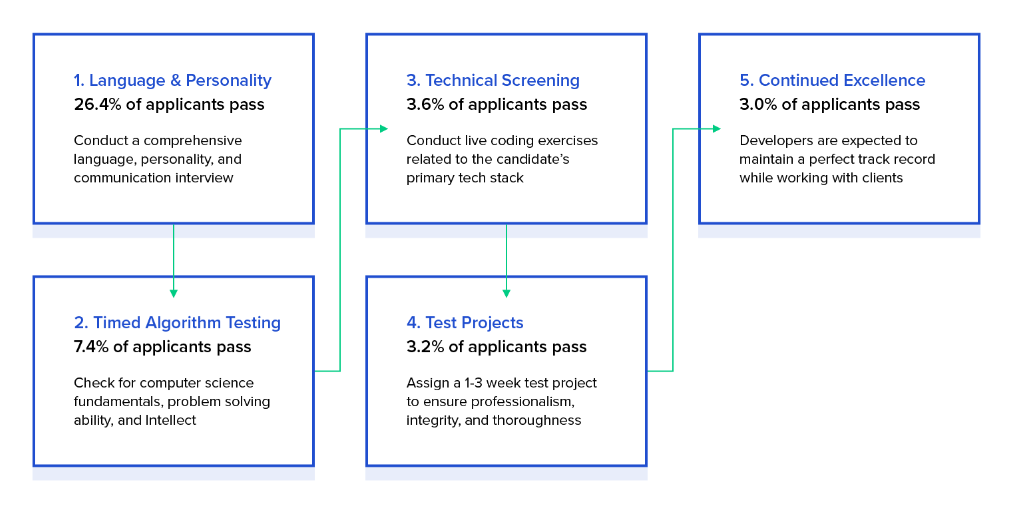

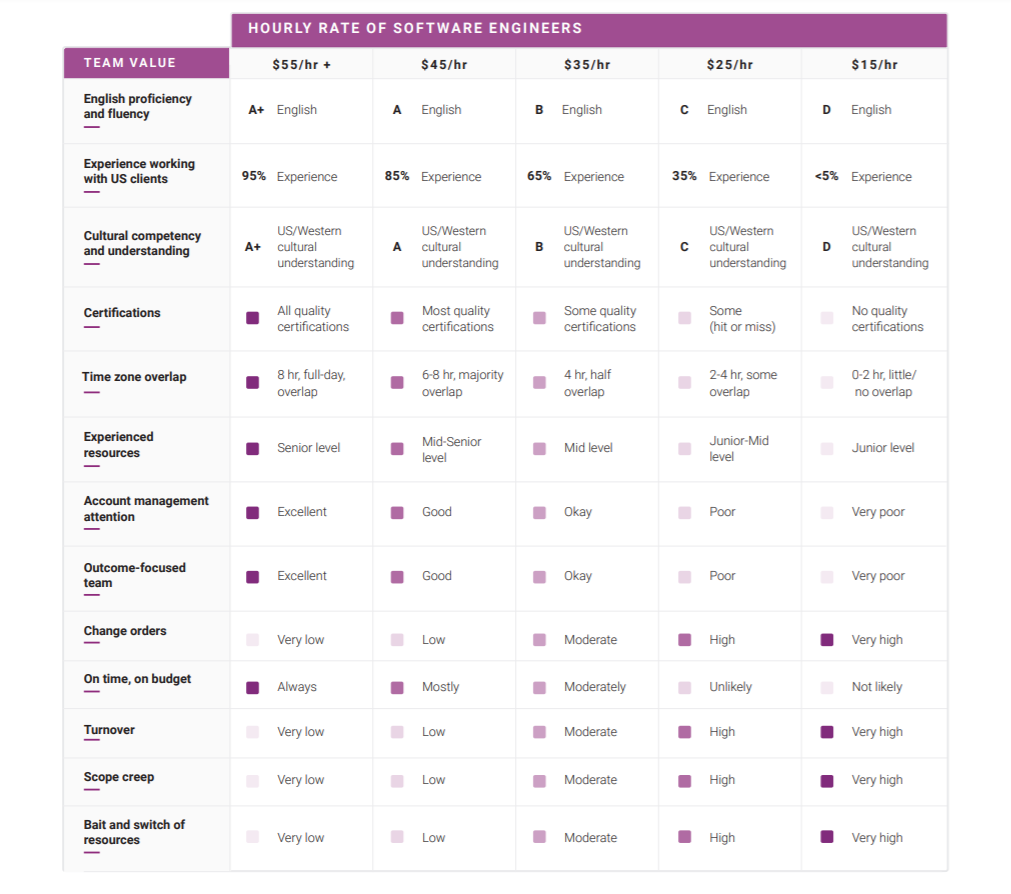



Comments (0)